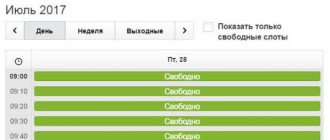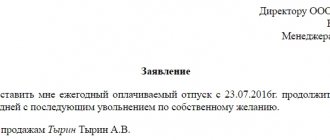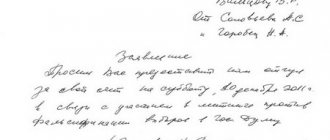Home / Labor Law / Vacation
Back
Published: 05/26/2016
Reading time: 7 min
0
3341
Donation is an important social phenomenon that helps many people with serious illnesses. Therefore, the state encourages people who voluntarily donate blood .
In addition to financial and material rewards, donors can count on temporary release from work - time off for donating blood. The procedure and conditions for obtaining it are worth considering in more detail.
- Duration and legal regulation
- Design features
- Application for time off: writing rules and sample
- Registration procedure
- Payment Features
- Mark on the report card
Duration and legal regulation
The procedure for compensating rest for an employee who voluntarily acted as a donor is determined by labor and federal legislation, namely:
- Federal Law of July 20, 2012 N 125-FZ “On the donation of blood and its components”;
- Art. 186 Labor Code of the Russian Federation.
In accordance with this article, an employee is released from work during the following periods of time:
- On the day of the medical examination. This procedure is often performed before donating blood to ensure that the donor does not have any medical conditions. The fact of absence in this case is confirmed by a special document - a certificate in form No. 401/u.
- On the day of blood donation. In this case, the employee has every right not to come to work. However, if he decides to begin his work duties, then in the future he may get a day off at another time of his choosing. In this case, going to work is allowed only for workers with normal working conditions - for harmful or dangerous ones this is not allowed. Confirmation occurs by providing a certificate in form No. 402/у.
- On any other day at the employee's discretion. A subordinate can receive such additional time off at any time. Most often, these days are added to the next annual vacation.
Thus, it turns out that the maximum duration of rest in the case of blood donation can last three days.
In this case, the leave as such is issued for one day, but at any time convenient for the employee.
Who can be a donor
According to the law, people who have reached the age of eighteen or have acquired full legal capacity before reaching the age of eighteen, who have expressed a voluntary desire to donate blood and its components, have undergone a voluntary medical examination and have no medical contraindications for donating blood and (or) its components, can donate blood.
A medical examination of the donor before donating blood and the issuance of certificates about his state of health are free of charge.
Before collecting biomaterial, this person must:
- verify your identity using a passport or other identification document;
- inform the doctor about all past infectious diseases, being in contact with infectious patients, staying in areas where there is a threat of the emergence and spread of mass infectious diseases or epidemics, about the use of narcotic drugs, psychotropic substances, about working in harmful and dangerous working conditions, and also vaccinations and surgical interventions performed within a year before the date of blood donation;
- undergo a medical examination;
- donate blood to determine its characteristics: group, hemoglobin level and hematocrit.
- Entering the research results into the donor's card;
- Based on research, the transfusiologist allows for donation and determines its type, as well as the volume of blood and its components taken;
- Registration of “Referrals for blood donation, plasmapheresis, etc.” (form N 404/у);
- the donor is sent to the department for collecting blood and its components.
The biomaterial is selected in the following form:
- blood;
- plasma;
- immune plasma;
- plasma for fractionation;
- blood cells.
If it is rented for a fee, then its price depends on the type of material. For example, in 201, for 100 ml of simple blood they paid up to 8% of the living wage in force on the date of blood donation, established in the subject of the Russian Federation where the citizen donates blood. The size of the fee depends on the blood phenotype and the presence of red blood cell antigens.
They pay significantly more for blood cells:
- platelets - 35% of the subsistence level;
- red blood cells - 25% of the subsistence level;
- Leukocytes - 45% of the subsistence level;
- Plasma - 15% of the subsistence level.
Each citizen from whom biomaterial has been collected must be given hot meals in a medical facility.
This mandatory preference can be replaced by a cash payment
in cases established by the Ministry of Health:
- donation of blood and (or) its components using mobile blood collection complexes;
- if the donor submits a written application to replace free food with monetary compensation;
- in case of donation of blood and (or) its components in premises provided by the employer.
Its size is equal to 5% of the established subsistence level of the working-age population in the subject where blood donation is made.
Design features
There are certain features when taking time off:
- The employer must pay the employee for rest time. The amount of payment is determined based on data on the average salary of a subordinate for the last period.
- The employee is not required to notify the employer in advance of his intention to donate blood, since such a provision does not exist in the law. In principle, he can simply miss two working days and then show up at work with a certificate from a medical institution. Even if during this time the dismissal procedure for absenteeism was initiated against him, it will be terminated after the certificate is provided. However, it is still recommended to notify the employer about your expected absence and write a statement in advance.
- An employer cannot influence a subordinate in choosing the day to donate blood or the day to take a day off. The right to choose in this case remains entirely with the employee. Management only needs to properly document this procedure.
- The right to time off received for donation is retained by the employee for a limited period. This period is one year - after its expiration it will no longer be possible to receive the required days of rest.
- Time off that is provided for donating blood while working for one employer does not carry over to new employment. The right to receive them is retained only at one workplace. In this case, the period does not matter - even if another year has not passed since the blood donation, the new management is not obliged to release the employee from work.
If at the time of donating blood the employee was on regular paid leave or had a day off, then in the future he can take two days off.
As for replacing time off with monetary compensation, such payment is not provided for in current legislation.
Compensation for donating blood
Donors are compensated in 2021 if they:
- have a rare blood phenotype discovered during previous blood collections: ccDEE, CCDEe, ccddee, CcDEE, Ccddee, CCDEE, CCddEE;
- lack one of the following erythrocyte antigens: k, -S, -M and others;
- are allowed to be donated by apheresis of plasma, platelets, erythrocytes, and leukocytes.
These grounds are identified during a medical examination or thanks to the medical documents of the giver. Even with such facts, the DC can voluntarily agree to the procedure for free.
Payment options for blood donation:
- 8% of the current minimum subsistence level in the subject of the Russian Federation on the day of donation, where it is donated, if the donor has a rare phenotype or is deprived of one of the erythrocyte antigens, for one donation of 450 (+/- 10%) ml;
- if DC is allowed to be donated through apheresis of plasma, platelets, erythrocytes, leukocytes, one plasma donation of 600 (+/-10%) ml will already bring 15% of the subsistence level. One donation of platelets in a minimum volume of cells costs 35%. One volume of red blood cells (400 ml +/-10%) - 25%. The dose of leukocytes minimum cells is 45%.
Who specifically pays for donor days according to the law - directly the employer or the Social Insurance Fund
As previously reported, after blood sampling, the citizen is issued a special certificate confirming this circumstance. In particular, it provides a link to Article 186 of the Labor Code, which states that on the day the donation occurred, the donor is retained his average earnings directly at the place of work, and is also given another day off, which is used at his own discretion.
At the same time, Order 580 of the Ministry of Labor notes that the Social Insurance Fund provides, at the expense of the insurance premiums it receives, the following activities initiated by the employer:
- assessment of workplaces;
- improving conditions for staff;
- occupational safety courses;
- purchase of workwear;
- sanatorium treatment for workers involved in hazardous or difficult work;
- medical examinations;
- therapeutic nutrition;
- purchase of breathalyzers and tachographs.
Also, the funds allocated by the fund are used to pay for disability benefits or maternity leave.
It follows from this that reimbursement to the employer of the money given by him to donors for the days due after donating blood is not provided.
How are vacation days provided to donors paid?
There are several very important nuances here. Thus, in accordance with current legislation, when blood was drawn on a working day, earnings are calculated using a weighted average.
To determine how much you will be credited for a donor day, you should do this:
- determine total income for the last six months;
- divide it by the number of working days in this period.
Is it permissible for a donor to take compensation instead of a day off?
The donor's day of rest should be considered as additional vacation. According to the law, the employee has the right not to take time off, but to demand payment of compensation. This is done in:
- in a declarative manner, if the person continues to work;
- automatically when he quits.
Days unused during the calendar year expire after its completion. If you change your place of employment, donor days off are also cancelled.
Application for time off: writing rules and sample
To apply for time off, the employee must write a corresponding application. It is drawn up in free form and should contain the following data:
- Full name of the person in whose name the application is written (that is, the manager);
- surname, initials and position of the applicant;
- request for a day (or days) of rest indicating their specific date;
- reason for time off (i.e. blood donation);
- a document confirming the existence of grounds (certificate from a medical institution);
- date of compilation and signature.
A sample application can be found here.
It is worth considering that the preparation of this document is a voluntary matter for the employee; the Labor Code of the Russian Federation does not contain provisions regarding its mandatory provision. However, having an application will greatly simplify the procedure for granting time off for the employer.
Taxation
Having figured out how donor days at work are paid, we move on to the issue of taxation. The list of income on which personal income tax is not charged (Article 217 of the Tax Code of the Russian Federation) does not include the day of the medical procedure. According to Resolution of the Presidium of the Supreme Arbitration Court of the Russian Federation No. 104/14, payment of earnings is carried out in the presence of an employment relationship. Accordingly, insurance premiums are deducted from it. That is, payment for days of blood donation and deduction of taxes from these amounts is carried out on a general basis. Since these payments are made from the organization’s payroll, the base for calculating income tax is reduced. The amount of earnings and insurance premiums is included in expenses for operating activities.
Registration procedure
The registration procedure largely depends on when exactly the employee notified of his absence from work: before or after donating blood. Generally speaking, it can be presented as follows:
- Receiving a statement from a subordinate.
- Issuance of an order granting time off. It must indicate the date chosen by the employee. The order is given to the subordinate for review and signature, as well as to the accounting department for calculation of payment.
- Entering time off into the time sheet. For this, a special alphabetic or numeric code is used.
- Accounting department accrues payment for rest days.
This option is used if the employer was warned by the employee in advance. If the latter simply showed up for work after two days of absence and provided a certificate, then it no longer makes sense to take an application from him and issue an order.
It is also impossible to punish an employee for this, since his absence from work was caused by a valid reason.
How to record donor days on the timesheet?
Donor time off can be recorded in the timesheet only if the employee provides the employer with the relevant certificates:
- the first is issued when a person undergoes a medical examination (form No. 401/u);
- the second is issued on the day of donation (form No. 402/u).
In this situation, the following points may arise:
- If, when submitting the biomaterial, the employee did not warn the administration of his company, then in the report card about. Upon receipt of the certificate, the mark on absenteeism is changed to “absenteeism while performing public duties.”
- If the day of donation becomes a working day for an employee, then the work output is noted in the timesheet. In this case, a paid day off is assigned on the date chosen by the donor citizen.
- If an employee took two days off on the basis of a donation and did not warn the managers, then after presenting certificate No. 401/u, the days of “failure to appear” are corrected to legally paid days.
- If an employee presented certificate No. 401/u (about passing a medical examination), but subsequently did not confirm his actions with certificate No. 402/u, then the missed day will be recorded as a “failure to appear” and will not be paid.
Payment Features
Regardless of whether the employer was warned in advance about the upcoming time off, he is obliged to pay the employee for all days of rest due to him.
Payment should be based on his average earnings. In this case, the payment is generally subject to income tax, and insurance premiums are also paid from it. If the employer refuses to pay, the subordinate can file a corresponding complaint with the labor inspectorate of the city or region. In some cases, it is possible to go to court with a claim to recover illegally withheld wages.
Postponement of holidays while on vacation and how to arrange it correctly. In our material you will learn about additional payments due to people over 80 years of age in the Russian Federation. You will learn the reasons why it is beneficial to quit by agreement of the parties in our article.
Management Responsibility
Sometimes citizens are faced with the fact that authorities do not want to comply with legislation regarding donation. Managers try to save money and not pay for additional vacations.
In this situation, it is necessary to complain to the labor inspectorate. It is this organization that monitors the implementation of legislation in the field of relations between workers and employers.
As a last resort, you can go to court. This body always stands on the side of the donor, who performs an important mission for society.
What to do if the employer does not want to give rest days to the donor?
Federal Law No. 125 states that leave for blood donors is granted only on the basis of certificates No. 401/ and No. 402/u, which they must give to their employer. However, there are pitfalls in this matter that you need to be aware of:
- Sometimes employers try to punish an employee who has not shown up for work for two days for absenteeism. The Labor Code of the Russian Federation does not say that the employee is obliged to warn the employer that he is going to donate his blood. Therefore, punishing the employee in this case will be illegal.
- A violation of the law can also be considered when an employee is given only one additional day off, provided that he submitted the biomaterial on a day off or during the vacation period. By law, the employer in such cases is obliged to compensate for two days.
- The administration of the company where a person works cannot indicate which days the employee should take. The employee himself chooses the most convenient dates for additional vacation.
Important!
If a donor’s rights are violated, he should contact Rostrud, which specializes in resolving conflicts between employees and employers.







